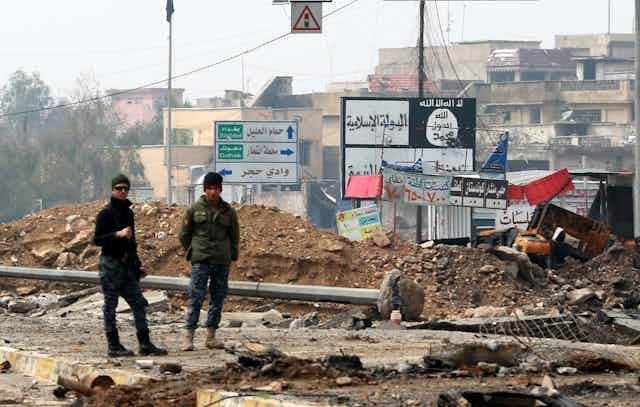The battle to fully recapture Mosul from the Islamic State (IS) is in its final stages – and it is rapidly intensifying.
On March 17, 200 civilians were killed in airstrikes on western Mosul mounted by the US and the Operation Inherent Resolve coalition. Lt Gen. Stephen Townsend, commander of Operation Inherent Resolve, suggested that the US might be directly responsible for the deaths: “because we struck in that area, I think there’s a fair chance that we did it”.
This is the latest in a series of incidents involving collateral damage. Townsend suggested that the fighting in Iraq’s second city is “probably the toughest and most brutal close-quarters combat that I have experienced in my 35 years of service”.
The battle for Mosul has put thousands of civilians in the crossfire. The people of Mosul have endured hell under IS rule, some now being used them as human shields in a clear breach of international law. As one told the BBC:
People who didn’t support Daesh [IS], or pay allegiance to them, or who carried a mobile phone, were hanged all day at traffic lights then killed and burned. They hanged them also on bridges for a month or two until you could see their bones.
Now the battle has moved into Mosul’s Old City and the area around the Grand Mosque of al-Nuri, and IS is being forced back street by street. But the fighting in these densely populated areas is ferocious, and few of its residents are able to leave. This all only increases the pressure on Iraq and its allies to liberate the city The way the IS threat is ultimately defused will have serious implications for both Iraq and the Middle East at large.
When it comes, the liberation of Mosul will be met with great acclaim – but only then will the most difficult challenges begin. As Iraq has learned before, winning the war is the easy part – winning the peace is far harder.
Falling apart
Recent history has divided Iraq along sectarian lines that long predate IS. After the Arab uprisings of 2011, relationships between regimes and societies across the Middle East and North Africa became increasingly fractious. All over the region, the structures that kept governance in place began to fall apart – and, in a number of cases, sovereign states themselves began to fragment. Ideas of authority and citizenship, both vitally important to keeping divided societies together, suddenly came into question.
The violence that flares up along Iraq’s divisions often descends into a back-and-forth of reciprocal brutality – take the 2014 Speicher massacre, where 1,700 army cadets were killed by IS close to Tikrit.

When the cadets’ bodies were found in 2015, the Iraqi state executed 36 men convicted of the massacre. And now, the Popular Mobilisation Forces who have entered Mosul are extracting their own violent vengeance. In many parts of the country, revenge attacks on those who are believed to have been complicit in IS rule in Mosul are commonplace, while those whose family members were involved with the group are increasingly marginalised.
The government in Baghdad will want to ensure that the spaces left over from IS governance are filled. But IS gained a great deal of popular support as a consequence of this sectarian violence – and the perception that nobody has been speaking for the country’s Sunnis, much less protecting them. Baghdad must ensure that policies are driven by a desire to improve Iraq, not to privilege one group over another.
After all, the main responsibility of any state is to protect its citizens – but after years spent struggling to keep a lid on things, the Iraqi state seems almost at a loss.
On the line
Western Mosul may be close to liberation, but conditions in parts of Iraq are deteriorating – and the collateral damage is abhorrent. Millions of people in Iraq have been displaced, along with many more made refugees by the war in Syria. As an Amnesty report documents, “many have fled with little more than the clothes on their backs, setting off at night to avoid detection and walking for hours along treacherous paths”.
Even when IS is defeated in Mosul – which it will be – it won’t be finished. Instead, it will change its tactics into more of an insurgency-style operation, much as it did after the fall of Fallujah. The gaps that IS currently fills will suddenly be opened up and a plethora of different actors will compete to fill them. Kurdish groups are already thriving – the Kirkuk provincial government has voted to fly the Kurdish flag on all government building in the province, much to the chagrin of the Baghdad government.
Iraqis are all too aware that violence begets violence and marginalisation begets marginalisation. This is why it’s so critically important that the forces arrayed get Mosul right. As Stephen Royle and I have written, to stop extremist groups from taking hold again Iraq’s civilian and military leaders need to create stable, equitable conditions that foster pluralism and inclusivity. At stake is nothing less than the future of Iraq itself.

